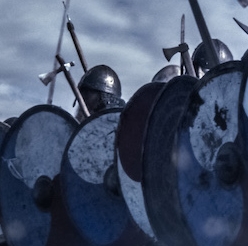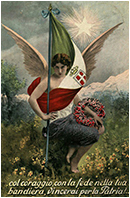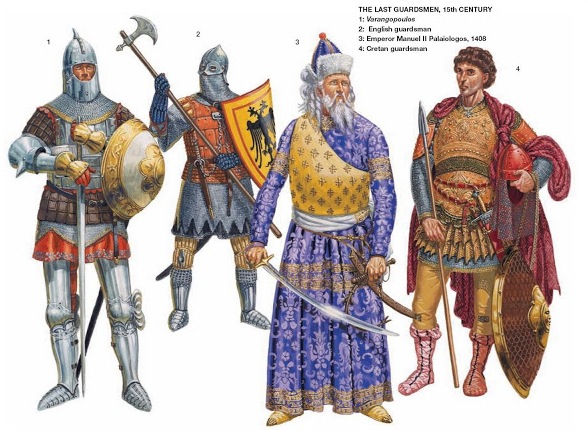0






| Thumbs Up |
| Received: 20 Given: 5 |

No. Jesus was jewish.
He did use christianity as propaganda, since 90% of german people were christian.














| Thumbs Up |
| Received: 2,139 Given: 2,862 |

The most interesting thing about Hitler is some of those who were closest to him did not sell him out up until the day they died. One of them being Max Wunsche who kept a low profile after the war. Otto Gunsche being another. I know a man who knew Wunsche. He said Wunsche thought highly of Hitler even in the 70s. He said remember Victors wrote the history. It makes me wonder how much truth we have about everything.



















| Thumbs Up |
| Received: 4,385 Given: 1,891 |

German camps were different from the Italian ones yes. The ones used by Italian were manly for Slavs: https://en.wikipedia.org/wiki/Rab_concentration_camp
List: https://en.wikipedia.org/wiki/List_o...ntration_camps (Italian wiki page is better)
Some of my threads:














| Thumbs Up |
| Received: 2,139 Given: 2,862 |














| Thumbs Up |
| Received: 9,991 Given: 21,752 |

Why would a christian want to push germans towards Paganism?
He , like most politicians, was a liar and wanted to gain votes.














| Thumbs Up |
| Received: 9,991 Given: 21,752 |

fixed
and varangians were not pure "slavs" but scandinavian
http://www.soldiers-of-misfortune.co...gian-guard.htm
The Varangian Guard in Byzantium is one of the very few mercenary units whose history can be counted in centuries.
The Norsemen had to travel far beyond the boundaries of their known world. From the point of view of the Byzantines, these Norsemen came from a distant land, Thule, told of only in myths and legends.
By the 9th Century, Swedish Vikings had travelled along the great rivers into modern-day Russia. They came as traders or as raiders, depending on how they calculated their chances of making profit. They quickly constructed their first fortified trading posts and began subduing the local population.
By 850 they had founded their own principalities in Novgorod and Kiev, and the small ruling elite which they managed to form intermarried with Slavic noble families to consolidate their power. The Slavs called the Norsemen "Rus" and soon the word became synonymous for the whole realm united under the leadership of Kiev.
They reached the Black Sea, crossed it and discovered in the riches of Constantinople the true object of their desires. Already by 860 they had made their first attack, followed by others until the last great assault in 1043. But between these unsuccessful attacks the Kievan princes traded with Byzantium, married Byzantine princesses and supplied the Byzantines with mercenaries.
The Byzantines routinely contracted foreigners: Normans, Hungarians, Turks, Lombards, Georgians, Armenians, Arabs, Slavs and many others. The first Rus mercenaries are mentioned in 902 as part of an expedition to Crete. Since the recorded names are all of Nordic origin, it can be assumed that this 700-strong auxiliary force consisted mainly of Varangians.
As a result of internal fights in Kiev the Varagians became firmly established in Byzantium.
There Vladimir the youngest of three brothers and pretenders to the throne was forced to flee "across the sea", with the aid of a relative he was able to recruit numerous Varangians who helped him conquer the throne of Kiev. After that he was apparently confronted with the problem that he could not pay his allies, who nonetheless showed little desire to return to their homes. It is said that they impetuously demanded to be shown the way to "Miklagard", as the fabulous Constantinople was called in Scandinavia. It was probably a relief, then, when Basisl II, emperor of Byzantium, asked for military assistance to suppress some serious rebellions. Vladimir sent 6,000 of his restless, quarrelsome warriors to Basil, who was able to consolidate his power with their help. From then on, the Varangians, or the "axe-bearing barbarians", formed the core of the Imperial Bodyguard.
In the following years the Varangians fought in Syria, Armenia and Sicily. Not all arriving Norsemen entered the Imperial Guard automatically however. This was a very exclusive unit, whose members received higher pay, could be among the first to loot after a victory, and even had the privilege of plundering the emperor's palace after his death. many newcomers from Scandinavia served in other units until they had collected the necessary capital.
a Byzantine chronicler tells of the fighting in southern Italy in 1018 against Lombards and Normans: "When the Emperor learned that brave knights had invaded his country, he sent his best soldiers against them. In the first three battles the Normans were victorious. But when they encountered the Rus, they were defeated and their army was completely destroyed."
In the Battle of Beroe (1122) against the Pechenegs, when all other troops had failed to break the circled wagon train of the Pechenegs, the officers cried finally for the "Emperor's wineskins", as the guardsmen were sometimes called due to their habit of heavy drinking. Although heavily outnumbered they broke the circle and slaughtered numerous enemies.
They were especially appreciated, however, for their loyalty. According to Anna Comnena, the Greek princess and a major source of information regarding Byzantine history, they passed down this loyalty from generation to generation almost like a sacred heritage. As foreigners, they didn't have much to do with the cabals and intrigues at the Byzantine court. In addition, they were probably brought up from childhood to be loyal and faithful to those who paid and rewarded them.
When the Varangians had become a permanent institution, the connections between Scandinavia and Byzantium proved ideal for the recruitment of mercenaries. On the one hand there was the rich empire with its constant need for reliable troops, and on the other the poor rural regions of Scandanavia where the warlike population was looking all over Northern Europe for ways to make their fortune. The Varangians from Sweden were soon joined by those from Denmark and Norway. Some even made their way from distant Iceland.
A number of inscriptions on runestones in Scandinavia bear testament to the fate of these lost sons. One reads, for example: "In memory of Folkbjôrn who died in Greece"; and another: "Raised by Vefar in memory of her brother, who died in Arabia." Fewer, however, record the good fortune of those like a certain Mursi: "He made a lot of money for his heirs in Greece."
Nevertheless it seems that those who returned with a fortune were the best advertisement for new recruits seeking to enlist.
So the Icelandic Laxdaela Saga tells of a certain Bolli Bollason who went to Byzantium and there climbed the ranks to become an officer of the Varangian Guard. One can imagine the repercussions of such stories in poverty-stricken Iceland, where, even as recently as the 20th century, people were living in caves, dried fish were a staple food and boiled sheep heads a delicacy.
But poverty wasn't the only reason for the long journey. Byzantium also became a hideaway for those who were on the run from the law or a blood feud, or those who had to go into exile after a change of power at home.
The most famous of these was Harald Sigurdsson, later better known as Harald Hardrada, King of Norway. He was the younger half-brother of the Norwegian King Olaf II and had to flee after the latter was defeated at Stiklestad in 1030. Like many of these princes in exile who tried their luck as leaders of mercenaries, in time he gathered around him some retainers and was able to rally other émigrés. This freed him from starting his career as a simple mercenary and provided him with a whole troop of experienced warriors loyal to him alone.
From Sweden Harald went first to Kiev where he stayed for several years in the service of Prince Jaroslav, until 1034 when he arrived with 500 men in Byzantium.
he and his men were used in the navy to fight Arabian pirates. After, from 1038 to 1041, they fought under the famous Byzantine general George Maniakes in Sicily against the Arabs. The wealthy towns there offered many opportunities for pillaging. One Saga in particular relates how Harald's men stormed a town, "killing the men, plundering all the churches, and taking immense booty." Harald become famous in the course of the war and most likely entered the Guard as an officer after his return to Constantinople. In the meantime he had amassed great riches.
The Heimskringla tells that he sent a huge quantity of treasure to Prince Jaroslav of Kiev for safekeeping. A good part of it came from Sicily, but he had also made a lot of money fighting against the pirates.
After the war in Sicily he fought in Bulgaria, and was then used along with his unit as a tax collector, which also offered great opportunities for enrichment. It seems that Harald took advantage of this extensively, because he was finally thrown into prison for embezzlement. Two Icelanders who served as officers in the Guard shared his fate. The Guard, who considered such misappropriations as their given right, was apparently outraged, for it is reported that the new Emperor Michael V replaced his Varangian bodyguards with Scythian slaves.
Through these events the Varangians lost a lot of influence. They remained in their barracks sullenly while their officers conspired against the new government, and an opportunity soon presented itself. When Michael V incited huge popular uprisings in Constantinople, which some Varangians apparently joined. While the battle raged around the palace, conspirators freed some of the most important prisoners, among them Harald, so as to ensure the loyalty of the Guard.
In the meantime the defenders of the palace had been able to drive back the masses with the help of archers, and soon received reinforcement from troops arriving from Sicily. It is probable that there were also Varangians among these reinforcements, so that they now fought on both sides. It would have been Harald's job and that of the other officers to persuade the newcomers to switch sides and join the rebellion. It seems they were successful, as the palace was finally taken after a particularly bloody battle. The Varangians formed the spearhead, forcing their way to the chapel with their axes, where they seized the Emperor and his uncle at the altar. Shortly after, the two were blinded according to Byzantine tradition.
It's little surprise that thereafter Harald regained all of his former titles and no one dared to speak of his previous embezzlement. He took advantage of the fighting for the palace and the subsequent purge to plunder and amass still further riches.
Soon after he learned that the son of his deceased brother Magnus had claimed the Norwegian throne. He apparently came to the conclusion that he himself, as an experienced warrior, would be better suited to the position and set out for Norway. According to the legends the Emperor wouldn't allow him to leave and he had to escape in secret with the help of a lover. But it's more likely that he used a campaign to clear out with his troops to Kiev. There he remained for some time and married the daughter of Prince Jaroslav until he returned to Norway, where he became king in 1047. In 1066 the old warrior fell in the Battle of Stamford Bridge in the attempt to conquer England.
That they took side against the emperor remained an exception that can only be explained by the fact that they were previously deprived of privileges and some popular officers were thrown into prison. When the Byzantine army went in 1071 to the disastrous Battle of Manzikert, the Frankish and Norman knights mutinied while still on the march, and succeeded later in avoiding the battle itself. The Varangians, however, on that day fell, almost to the last man, guarding the emperor, who was subsequently taken prisoner. Also in 1081, during fighting for the imperial crown between Nicephorus and Alexius, the Varangians were almost the only ones who remained loyal to Nikephoros, while his German mercenaries secretly opened a door to Constantinople for Alexios. The reign of Alexios brought some important changes. It seems that the traditional supply route along the Russian rivers and from Kiev dried up slowly. Later the state of the Kievan Rus disintegrated into various rival regional powers.
On the other hand, pilgrimages to the Holy Land became more popular as the maritime routes from Northern Europe to the Mediterranean developed. Of course, there were still Varangians arriving from Kiev, but the share of Slavic-speaking warriors among them was growing rapidly. Many were pure Slavs, while others were the descendants of former Norsemen who had by then been living for generations in Eastern Europe. Nonetheless, warriors with a different origin began to arrive on the scene.
After the Normans had conquered England in 1066, many of the established families preferred to seek their fortune in foreign lands. At first it seems that most of these exiles from England had Danish origins from the so-called Danelaw, and they subsequently followed the footsteps of their Danish cousins to Byzantium. But soon many Anglo-Saxons followed also, often making up the majority of the Guard. A chronicler at this point distinguishes between "Inglinoi", "Rhos" and "Vrangoi", ie between Anglo-Saxons, Russians and Scandinavians.
But the most significant change was with the arrival of the Normans in Italy, when Byzantium encountered a new and particularly dangerous opponent. Like the Kievan Rus the Normans had their origin in Scandinavia, but had settled in Normandy were they adapted more quickly than the Rus to the country's language and customs. From there, some had made their way to southern Italy, where they - much like the Varangians - first tried to loot the Byzantines and when that didn't work, served them as mercenaries. Harald Hardrada fought under the command of the Byzantine general George Maniakes side by side with the three sons of Tancred of Hauteville, Drogo, William Iron Arm and Humphrey. Meanwhile the Normans had not only displaced the Byzantines from Apulia and Calabria, but also conquered Sicily. Far from satisfied, they spotted in the Byzantine Empire, hard-hit by the Turks and exhausted from the internal struggles, a really worthwhile prey.
Normans and Anglo-Saxons After Robert Guiscard (another son of Tancred) had united all Norman domains under his rule, in 1080 he began to muster a strong invasion force mobilizing nearly all men who could carry weapons in southern Italy. The following year he ferried his army over to Dalmatia and besieged Dyrrhachium (Durazzo). The Emperor Alexius finally brought up a relief army including the Varangian Guard as the backbone, in which many Anglo-Saxon exiles who had fled their country after the Norman conquest were serving. In the ensuing battle the Byzantine troops were driven back or routed and only the Varangians, who formed the left wing, attacked with such zeal that the Normans began to retreat.
Soon the whole Norman wing was on the run from the fierce onslaught of the axe-swinging Varangians. Only the personal intervention of Roberts Guiscard's wife, the Lombard princess Sikelgaita, saved the day. Like a true Valkyrie she fought in full armour, rallying the fleeing Normans. Meanwhile Robert came up with the reserves and attacked the far advanced and exhausted Varangians in their flank. Cut off from the rest of the army and attacked from several sides, they retreated to a nearby church, which was then set on fire by the Normans, so that most of them perished in the flames. The battle was lost and Alexius was lucky to escape with the rest of his army.
Byzantium survived this crisis as well, funding uprisings in southern Italy and a new expedition to Rome by the German Emperor. Nevertheless the demand for warriors from the north remained unchanged. But at this time no more recruits arrived via Kiev and this traditional supply route was replaced by the Crusades.
Scandinavians in transit could be easily recruited, sometimes even whole units. It is reported that a Danish prince called Sveno entered the Imperial service with 1,500 men. It seems that the Byzantines employed Varangians as agents, who searched the port cities for compatriots, distributed wine and presents and painted serving the Emperor in the brightest colors. When, for example, the Count of the Orkney Islands passed through with six ships during the Second Crusade all his men were enticed away. The Count himself received lavish gifts and finally returned by land to his own country. If enough men couldn't be recruited among Crusaders and pilgrims, Varangian officers were sent as ambassadors to the kings of Norway, Sweden and Denmark to ask for warriors.
But the Crusades also brought about the end of the Varangian Guard. In 1203 Venice succeeded in using the whole crusader army for the conquest of Constantinople. As a consequence of the usual internal intrigues the only reliable troops on the Byzantine side where the foreigners: the Guard - mostly English and Danish by this time - and the Pisans, who defended their trade privileges against Venice. When the Crusaders managed to enter the city in their first major assault, they suffered heavy losses and were driven back by the Varangians.
As so often happened, the rot started at the top. When Emperor Alexius III snuck away from Constantinople with his treasures, the Varangians were persuaded by the Imperial Treasurer to free the blinded opponent Isaac II from jail. Then Isaac's son, who was the Venetian candidate for the throne was crowned as Alexius IV. Unfortunately he had already made the Crusaders huge promises of land and money. While he tried to raise the necessary money, the Crusaders plundered the surrounding countryside, and in the city a profound hatred of the Latins and their protégé Alexius IV grew. Finally there was a palace coup in which, with the help of Varangians, a new candidate won the throne as Alexius V. He had secured their assistance by explaining to them that they would otherwise be replaced by Frankish knights. Because the prior promises of Alexius IV with the Crusaders were now revoked, the Crusaders started their final assault in April 1204. When they entered the city at various points, the Varangians retreated with the Emperor to the palace. Here they held their ground until the emperor and large parts of the nobility secretly left the city. After negotiations they surrendered to the Crusaders, and one can assume that many of them found further employment there. Afterwards there is no more firm evidence of the use of Scandinavians in Byzantine service. The Imperial Guard was later formed by Cretans.

Last edited by crazyladybutterfly; 11-08-2016 at 04:07 PM.



















| Thumbs Up |
| Received: 4,385 Given: 1,891 |

Some of my threads:



















| Thumbs Up |
| Received: 12,781 Given: 8,063 |

Mario Roatta was a piece of shit, he was doing some things which were rarely seen in other areas controlled by Italians, in fact his main target were Slovenians not Croats so much.
Anyway, that concetraction camp was for slavic ppl who weren't part of Ustashes, and Fascists thought that every Slavic who is not with Axis that he or she is Partizan/Communist by default, but that camp was not for extermination, at least not on paper, but "war prisoners", even though they were mainly civilians there.
Also Mario Roatta wanted to clean Rab, Histria and Slovenia as much as he could from Slavic population, his words, they are written even on that wiki; "if necessary don't shy away from using cruelty. It must be a complete cleansing. We need to intern all the inhabitants and put Italian families in their place."
My Italian grandmother always denied this things, she was always saying to others that Italians were all fair to Croats in Dalmatia, but that was only partly true, because that was true for Dalmatia, not for the rest of Croatian coast, she knew that.
Italians when came to Dalmatia it was different story than on Rab (Rab is not Dalmatia but Kvarner and near Histria), Italians when came to Dalmatia they came with one and only one message; "You are not Croats but Dalmatians, you were all Slavicized long time ago it is time that you come back to mother Italy".
And many of Dalmatians changed their nationality to Italian, Italianization.
My grandfather (from father side) refused to accept Italian nationality but Italians didn't molested him because he had Italian wife from Italy lol, from Emilia Romagna.
So, Italians didn't push the matter further when it comes about my grandfather.
After Axis power were crushed 1945, Communist regime started to molest my grandfather because they were sure he was a Fascist because of my grandmother.
Both of them were always under microscope when Communists came, like all Italians who didn't left Dalmatia.
For years my grandfather had to prove to Communist he wasn't Fascist, they let him go but he could never be equal as rest of ppl who were Communists, not to mention about my grandmother, she was almost killed by some Partizan women when they entered into city.
Anyway, those were crazy times.
Last edited by Robocop; 11-08-2016 at 04:04 PM.



| Thumbs Up |
| Received: 11,269 Given: 13,631 |

Ustashas under Jure Francetic fought against Italians and against both Communists and Chetniks too. He saw Italians no better than Chetniks.
Reminds of serbian stories of babies thrown to crocodiles in zoo during the 1990s war.„Poglavniče! Moji crnci (Crna legija) su samo meni vjerni i samo smrt će me zaustaviti da se ne pridružim tamošnjim partizanima u borbi protiv Talijana koji nisu ništa bolji od četnika, jer pale i uništavaju našu domovinu. A ja kao rodoljub ne mogu to više podnijeti, a vi poglavniče odlučite o daljnjim postupcima. Vaš vierni i uviek odani Jure Francetić.”
There are currently 1 users browsing this thread. (0 members and 1 guests)
 Österreich
Österreich
Bookmarks